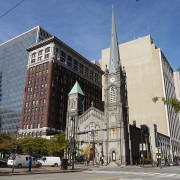INITIAL LEADERSHIP FOR YOUR NEW CHURCH Part I
“Now in the church that was at Antioch there were certain prophets and teachers: Barnabas, Simeon who was called Niger, Lucius of Cyrene, Manaen who had been brought up with Herod the tetrarch, and Saul. As they ministered to the Lord and fasted, the Holy Spirit said, ‘Now separate to Me Barnabas and Saul for the work to which I have called them.’ Then, having fasted and prayed and laid hands on them, they sent them away.”
(Acts 13:1-3)
“Where there is no counsel, the people fall; But in the multitude of counselors there is safety.”
(Proverbs 11:14)
THE SINFUL SELF-AUTONOMY OF THE CHURCH PLANTER
Having a prayerfully selected pastoral leadership team to which you are accountable going into a new church plant is plainly a good idea in most cases. Most church planters, including myself, tend to be do-it-your-self types. And so in an entrepreneurial spirit we set out to accomplish what’s on our hearts, our way, convinced the plan we have is the one that will establish the new church we dream to plant successfully.
This kind of self-autonomy can be American and western, but it isn’t always very New Testament and Christian. When Jesus sent out disciples He did so two-by-two. When Paul and Barnabas went on their first missionary journey they went together under the Holy Spirit unified decision of the other leaders who served the church in Antioch. In Paul’s later missionary journeys he always had at least a few good men with him whom he was benefiting from, and also training for leadership.
What’s the point? The point is that, biblically speaking, leadership teams are incredibly valuable. Having a leadership team doesn’t mean you aren’t the lead planter or senior pastor. It means you value the godly wisdom of others, you recognize that you have inherent flaws and a sinners’ heart that can wander, and that you need to benefit from what God is doing and has done in other Christians if you want to realize your full potential in Christ.
Practical Reasons to Prayerfully Seek a Team
Before I set out to plant a church in northern Utah I felt clearly convicted by the Holy Spirit that I needed to find some men He had in mind who would serve as the initial leadership team over the new church. Prayerfully following His leadership over me as the lead planter proved to be wise, as following the Holy Spirit and the example of Scripture always is. The Lord connected me with three men from different places and ministry experiences who all agreed to serve as an outside elder accountability board to me until local elders could be raised up. Let me share some of the benefits I experienced through having the support of a board of pastors to whom I was accountable as I started a new church:
A POOL OF KNOWLEDGE
Number one, the elder team provided a pool of knowledge beyond my own from which I could glean. Particularly if you’re a young planter with a lot of passion, you probably don’t know as much as you think you do. That is definitely true of me. Being able to bounce ideas off of guys I trusted who could affirm or challenge what I was thinking has been great. Sometimes I’ve stepped back from what would have been poor decisions through their counsel. Sometimes I’ve gone forward with their support. Sometimes I’ve taken their counsel and ended up doing something different than what was suggested knowing I had heard from the Lord. In every case I have had counsel and accountability and a group of good Christian men praying for me. That, my friends, is invaluable.
GOOD MISSIONAL STRATEGY
Number two, having the accountability of an elder team proved to be good missional strategy where I planted. If you’re from a culture used to hierarchical religious leadership structures similar to the LDS cultures where I’ve planted and served churches, you know that many people will be apprehensive if you appear to have gone rogue without any form of human authority or accountability in your life. Many people will actually think you are the cult in the area if you appear to be going it alone. I can’t tell you how many conversations I’ve had with committed Mormons who display skepticism about lone-ranger church planters. On the other hand, when I share with these same people that I have an outside accountability board of men who counsel me and help with oversight there’s always a sense of disarming in the conversation. I can tell that they get almost automatically less skeptical, and take me and the work Jesus has called me to do more seriously. So for some people, having an accountability board may remove obstacles to them hearing the gospel.
A GOOD SUPPORT GROUP
Number three, having an outside accountability elder board provided me with a sometimes much needed support group! Now, I agree that there can be no crying in church planting when you’re the lead pastor! On the other hand, I know from experience that church planting is generally hard work. Most of us aren’t planting in a time of revival where we’re seeing mass conversions. It isn’t like the hippy days of old for Calvary Chapel where, from the stories you hear, you can sometimes get the impression that all one had to do was go out on the street corner and yell Jesus’ name and five-hundred people would get saved on the spot.
If that happens for you, great! But more than likely, barring a sovereign revival sparked afresh by the Holy Spirit, planting a church is going to feel grueling! There might be times when you feel like giving up. There might be times when you wish the few people you do have coming to your new church would simply leave because of how they treat you and your family. There might be times when you begin to doubt your call. In times like these you need men to whom you can turn for exhortation, prayer, and sometimes flat out rebuke.
PERSONAL ACCOUNTABIILITY
Number four, an outside elder board has provided a source of not only ministerial accountability for me, but personal accountability. You and I are still sinners even though we are called to the ministry. Paul told Timothy, “God…saved us and called us with a holy calling, not according to our works, but according to His own purpose and grace.” What he is saying to Timothy is that not only are we saved by grace, but pastors are in the ministry by grace!
Sometimes when I listen to my own heart and the words of other planters I get the sense that we think we’re saved by grace, but that God put us in the ministry because of our works. We think He saved us in spite of our ugliness, but that He uses us because of our awesomeness. No, brothers! We are in the ministry by grace just as much as we are saved by grace.
As sinners who are in the ministry by grace we are going to need the grace of God often. We are going to deal with temptation. We are going to deal with failure. We are going to deal with the weight of the sin of those we serve. All of this is good cause to gather a good board of accountability elders who can restore us and encourage us in the grace of God from time to time. Don’t go it alone!
*In parts two and three of this series we will look at the kind of men you should look for when establishing your initial leadership team, as well as things to consider when transitioning to a local board of elders. Stay tuned.
Kellen Criswell
Lead Pastor, Refuge Church
www.refugeutah.org
www.refugeutah.tumblr.com
www.calvarychurchplanting.org




